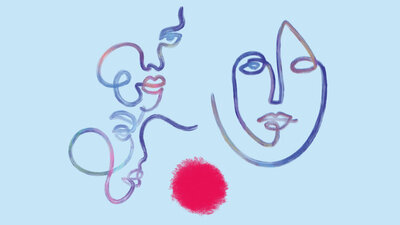I like myself
We don’t treat anybody else as badly as ourselves. That is the conclusion drawn by Kristin Neff. Especially women have a tendency towards hard auto-criticism and self-abandonment. Neff is a psychologist at the University of Texas in Austin (USA).
Her solution for the afore-mentioned problems: self-love and self-compassion. Her books on the subject are sold and read all over the world. Courses based on the subject have also been conceived. However, Neff has not invented the terminology and the underlying concepts. They are ancient and Buddhist – and yet perfect for the demands of our modern times.
In times when everything seems to be about self-optimisation. But many people suffer from this tendency, the permanent struggle to perform perfectly in all areas. To be mindful with oneself is a welcome counterdraft – and probably a good way to lessen the effects of the high demands we place on ourselves. Research has shown that people who show compassion to themselves have less stress-related reactions and fears. Interpersonal relations also benefit, strokes of fate are better dealt with, and self-esteem rises.
According to the experts, everybody can learn to achieve self-love and self-compassion. Here are some strategies devised by the experts that can help. Sometimes, we only need to make a few small steps, a few minor changes to show ourselves more understanding.
It’s not that bad! I forgive myself.
‘Self-love also means to accept oneself’, says Alexander Jatzko, principal consultant at the Clinic for Psychosomatics at the West Palatinate Hospital. With all weaknesses and mistakes. Something went wrong or not the way you intended? Don’t bash yourself.
The better way is to show yourself some understanding, to forgive yourself and to ask yourself what you can do differently in the future to avoid a repeat of the situation. ‘If you notice that the mistakes pile up because you are overloaded, then you should ask yourself what to change in life’, Jatzko adds.
At 5 p.m., I have an appointment with myself.
Have I really lived today, or have I just functioned? Alexander Jatzko recommends asking this question every night. If you get the feeling that you have just functioned, then think about what to do differently the next day.
What would I need to feel better and more relaxed? In order to enjoy my everyday life, too? Often, it does not require much. Read a couple of pages, phone your best friend, just sit in the sun for five minutes. Always plan for fixed times to do that.
What would I do if a friend was afflicted?
If our best friend makes a mistake, we usually try to comfort and strengthen them. We would encourage them to try again. This change of perspective may help to show yourself more compassion in difficult situations. Quite often, we are far stricter with ourselves than with others.
However, says Alexander Jatzko, we should not mix up compassion with self-pity. Do not get lost in thoughts about how bad the situation is. Instead, ask yourself what you would ask a friend: What can I do to make you feel better? Can’t you remember your many achievements and successes?
It' simple: NO!
A colleague in the office asks you if you could take over a task on the fly. And although we have heaps of work on our desk already, we agree. An acquaintance asks if we could help with a removal over the weekend. Although we are in desperate need of some rest, we cannot get ourselves to deny the request.
Quite often, we are afraid to become unpopular or to disappoint others if we say no. However, it is a sign of self-love if we know our limits. It’s not about saying no all the time. But you can practice not always to agree on principle – for example if you offer to accept the task at another time more suitable to you.
I am fine the way I am!
Younger, fitter, more beautiful, more relaxed – for almost every aspect of life, there are numerous products, advice literature and apps supposedly supporting us to become the best version of ourselves. But why should we try and be perfect at all?
‘We believe that we are socially more accepted, have a better career or be better parents’, says principal consultant Jatzko. But our brain needs a break once in a while, a rest without pressure. Ask yourself which targets and values are really important to you. That helps to take away the pressure and to accept yourself the way you are.
Don’t compare!
The best example: social networks. They often show perfectly staged photographs that have nothing to do with reality. ‘Especially for adolescents, that can be overcharging’, says Hanna Preuss-van Viersen, psychologist at the University Medical Center Mainz. Even adults easily get dazzled by these pictures, she adds. She authored a study that showed how adolescents with limited self-compassion were far more critical towards themselves than others.
‘These are findings we also know from adults.’ If certain pictures put you under pressure, indulge yourself. Preuss-van Viersen recommends limiting your time in social networks and thinking about the content that really inspires yourself.
More mindful from now on!
‘Mindfulness can help to identify self-deprecating thoughts’, says Johannes Fendel, researcher at the Clinic for Psychosomatic Medicine and Psychotherapy at the Medical Centre – University of Freiburg. But how would you go about that? Observe what is going on around you and inside yourself – without evaluating it.
Are there situations where you react in a funny way, get nervous, or feel unwell? Then you should take a closer look. ‘If you understand why you act or feel that way, it can help you to accept yourself better than before’, Fendel adds.
Danke! Merci! Thank You! Grazie!
In your daily routine, it is often difficult to notice and enjoy good moments. Researchers at the Leuphana University Lüneburg have found out that people inclined towards brooding benefit from gratitude exercises. The propositi were asked to practice noticing positive experiences for five weeks, and to also write them down.
In your everyday life, a ‘gratitude diary’ can help to sharpen your view for positive moments. You could, for example, write down three things you were thankful for every night.






